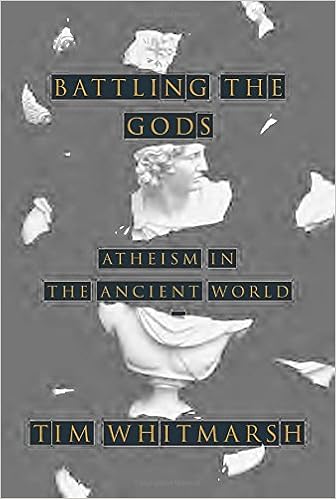 From UCambridge:
From UCambridge:
The claim is the central proposition of a new book by Tim Whitmarsh, Professor of Greek Culture and a Fellow of St John’s College, University of Cambridge. In it, he suggests that atheism – which is typically seen as a modern phenomenon – was not just common in ancient Greece and pre-Christian Rome, but probably flourished more in those societies than in most civilisations since.
As a result, the study challenges two assumptions that prop up current debates between atheists and believers: Firstly, the idea that atheism is a modern point of view, and second, the idea of “religious universalism” – that humans are naturally predisposed, or “wired”, to believe in gods.
The book argues that disbelief is actually “as old as the hills”. Early examples, such as the atheistic writings of Xenophanes of Colophon (c.570-475 BCE) are contemporary with Second Temple-era Judaism, and significantly predate Christianity and Islam. Even Plato, writing in the 4th Century BCE, said that contemporary non-believers were “not the first to have had this view about the gods.” More.
The book, Battling the Gods, sounds like a timely challenge to recycle bin research and pop science religion news.
The underlying message of the fungible research and news is that religion is somehow a “hardwired” automatic response to life as opposed to an inference from evidence—like all other inferences, with varying relationships to reality.
The pop science news approach mainly props up authoritarian atheism by pretending that atheism is not just one answer among others to questions like “Who are we?” and “Why are we here?” Just what we need in an age of rampant authoritarian government.
Bad for science journalism too, as it adds to the growing heap of evidence-free rubbish about evolution, while getting many basic present-day facts wrong.
But in an age when a war on falsifiability is being waged, maybe facts don’t matter so much. Readership, however, might matter to some publications that sponsor that sort of thing.
This book is showing good initial stats:
Amazon Best Sellers Rank: #3,563 in Books (See Top 100 in Books)
- #4 in Books > Politics & Social Sciences > Philosophy > History & Surveys
- #4 in Books > Religion & Spirituality > Atheism
- #5 in Books > History > World > Religious > General
See also: Early human religion: A 747 built in the basement with an X-Acto knife
If naturalism can explain religion, why does it get so many basic facts wrong?
Evolutionary conundrum: is religion a useful, useless, or harmful adaptation?
Imagine a world of religions that naturalism might indeed be able to explain
Follow UD News at Twitter!